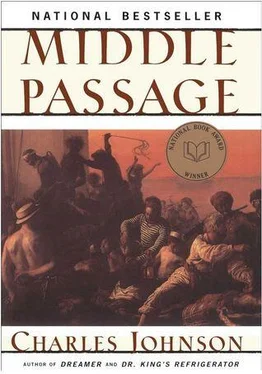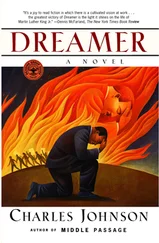“For what purpose?”
“Not mine, I assure you. If I understand his reasoning, it’s because I’ve made a bad show of everything else. He’s arranged many jobs for me, you know. I’ve been a bookkeeper for his company. Papa’s heir secretly despised by the employees who smile because he’s the boss’s son, then whisper behind his back about how unfair ’tis he’s standing in the way of someone who’s been there forty years. That sort of thing — do you see?”
I didn’t, but I didn’t admit it.
“I tried, of course; I wanted to prove to him that I could make a go of things on shore, as he did, but men like him or Falcon have always made me feel contrary. Sooner or later I find myself disagreeing with them, or doing something to defy their smugness, or saying, ’No! Your way of doing things is not the only way.’ Before this I was a clerk, a customs inspector, a higgler, an apprentice to a tailor, then a cabinetmaker, and twice engaged to women he thought suitable for me and, well. .” The mate smothered a belch. “None of them panned out. He was disappointed. I was disappointed.” He squinted at me. “D’you know what it’s like having a father such as this?”
“Hardly.” I tried to laugh to lighten his spirits. “I don’t even know who my father is. Mine was never there to expect anything of me, or to make me expect much from myself. I have no family traditions to maintain. In a way, I have no past, Peter. At least that’s how I’ve often felt. When I look behind me, for my father, there is only emptiness. . ”
“Then you’re luckier — and freer — than you know. You can never make a man like my father accept you on your own terms. Nor can you argue other alternatives with him, because material success is a pretty tyrannical proof for one’s point of view. Truth is what works, pragmatically, in the sphere of commerce. You can’t surpass him, because he’s done everything, been everywhere before you got there, knows everyone, judges everything in terms of profit and how wide an impression it makes in the world, and hasn’t left you any room to do anything except join his legion of admirers. And, worst of all, you must admire such awesome success as his, even though he feels, of course, that your mother corrupted you too much with books and crafts when you were young — it’s always the mother he blames, you know, for spoiling you with poetry, or. .” He lost track of his thought and rubbed his bladelike nose. “I’m here, Rutherford, because if he can’t have a son who’s a captain of industry, like himself, or a forceful personality like Falcon — they were old friends — or his favorite aide in his company, one William Jenson by name, who is really his son in spirit, I believe, one of those orphans who fashioned himself by his own hand, as my father says he did, and don’t even ask me to tell you how it feels to see him grooming this lad, who looked at me with such self-satisfied smirks that I could have strangled him. . if he can have none of these, then he wants, I suppose, a ship’s captain. Should I fail at this, there’s nothing else, because I shall not go crawling back to work in his company.”
“And you?” I asked. “What do you want?”
“Right now, I want to be left alone.” He laid his head on the table, cradling it in the crook of one arm. “All right? Just for a few moments before the first dogwatch begins. .”
I urged Cringle to sleep and helped him to his hammock. Across his shoulders, neck, and backside there were boils and chancres, some hard, some softened to the point that pus drained from the sores. The smell of him was terrible. A cheesy odor, which spread thick and palpable on the air when I leaned closer to cover him with a stiff stretch of sailcloth. His gums were infected too, bleeding down his throat, breaking his sleep with a rattling cough, like maybe both his lungs were riddled with holes.
And how did your narrator fare? Little better than the ship’s bravos, I confess. Whenever Baleka cried bitterly for her mother and no one could calm her, when Diamelo threatened to beat Squibb because the Falstaffian cook couldn’t decipher orders he gave in Allmuseri, or when one of the Africans was too weak to work and fell behind, the first thing I was forced to do was forget my personal cares, my pains, and my hopes before repairing to the deckhouse where the sufferers were sprawled. I placed a hand on each of their foreheads and listened. Though tired and sleepless, I clowned and smiled for the children; I told American jokes that failed miserably in translation. I prayed, like my brother, that all would be well, though I knew the ship was straining at every seam, making water, that beneath the thrashing waves there was only bottomless death, the extinction of personality, with not a sliver of land on the horizon, and perhaps all would not be well, as I told them until I worried the words into meaningless blather, perhaps only disaster lay ahead of us, but the “useful fiction” of this lie got the injured through the night and gave the children reason not to hurl themselves overboard before the first blush of whiskers had a chance to appear on their cheeks. If you had known me in Makanda or New Orleans, you would have known that I doubted whether I truly had anything of value to offer to others. Obviously, my master thought I did not. Once in Illinois when I felt jealous of Jackson’s chumminess with him and wanted to get on his good side, I asked, “Sir, what do you think I can do for others?” Peering up from under his brow at me, wearing a pair of Ben Franklin wire-frame spectacles, he replied, “Yes, that is the question, Rutherford. What can you do?” That helped my morale not at all. It made me feel as if everything of value lay outside me. Beyond. It fueled my urge to steal things others were “experiencing.” Believe me, I was a parasite to the core. I poached watches from Chandler’s bureau and biscuits from his kitchen; I pirated from Jackson’s trousers the change he made selling vegetables from his own garden; I listened to everyone and took notes: I was open, like a hingeless door, to everything. And to comfort the weary on the Republic I peered deep into memory and called forth all that had ever given me solace, scraps and rags of language too, for in myself I found nothing I could rightly call Rutherford Calhoun, only pieces and fragments of all the people who had touched me, all the places I had seen, all the homes I had broken into. The “I” that I was, was a mosaic of many countries, a patchwork of others and objects stretching backward to perhaps the beginning of time. What I felt, seeing this, was indebtedness. What I felt, plainly, was a transmission to those on deck of all I had pilfered, as though I was but a conduit or window through which my pillage and booty of “experience” passed. And momentarily the injured were calmed, not by the lie — they weren’t naïve, you know — but by the urgent belief they heard in my voice, and soon enough I came to desperately believe in it myself, for them I believed we would reach home, and even I was more peaceful as I went wearily back to help Cringle at the helm.
Not so with Ngonyama.
“This evil is visited upon us,” he said testily, stepping over his injured tribesmen, giving them water, which we had to ration closely, “for the crewmen we killed.”
“Do you think Diamelo sees it that way?”
He shot me a stare so fierce, like sparks from a blacksmith’s forge, that I had to look away. “Who else is there to blame? All well and good for you to blink at sin, Rutherford. You’re a Yankee” . His wide lips curled a little in contempt. “None of us were brought up to accept failure, or laugh it off, as you do.” Crabby, he rubbed his chin, then said an English swear word I never dreamed he knew. “I shall never understand you, Ndugu. We were forced onto this ship. Why have you wandered so far from your home?”
Читать дальше












